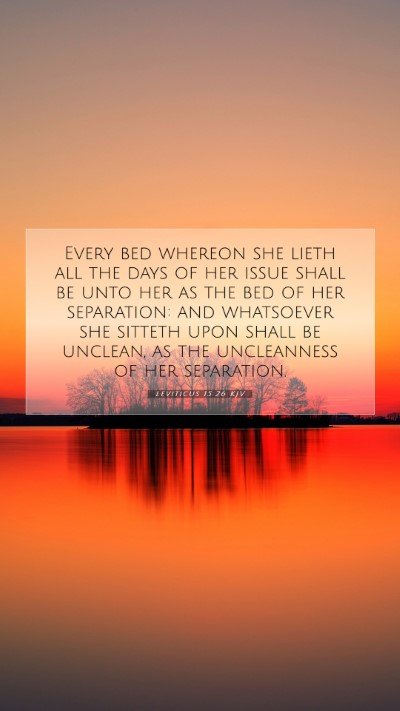Understanding Leviticus 15:26
Leviticus 15:26 states: "And if she be not cleansed from her issue, then she shall remain in her separation; all the days of the issue of her uncleanness shall be as the days of her separation: she shall be unclean." This verse discusses the ceremonial laws regarding women and their health in relation to issues of blood and uncleanness.
Bible Verse Meaning
The meaning of this Bible verse can be understood through the insights provided by several biblical commentaries, shedding light on its significance in both a spiritual and practical context.
Matthew Henry's Commentary
Matthew Henry interprets this verse as emphasizing the severe implications of ceremonial uncleanness in the context of Israelite society. He highlights the separation a woman experiences during her period of uncleanness, illustrating God's desire for purity and holiness among His people. It demonstrates the seriousness of maintaining ritual cleanliness, as it affected participation in communal and religious life.
Albert Barnes' Notes
Albert Barnes offers a practical understanding of this regulation. He notes that the laws of cleanliness were not merely hygienic but symbolized the need for spiritual purity. Barnes emphasizes that the physical state described in Leviticus reflects the separation of sin from the lives of worshippers, thus correlating bodily issues with spiritual conditions.
Adam Clarke's Commentary
Adam Clarke expands on the topic by discussing the implications for the women affected. He points out that the lengthy period of isolation could potentially lead to social stigma and emotional distress, demonstrating the cultural pressures surrounding concepts of purity. Clarke suggests that these laws illustrate a broader principle of the need for inner cleansing and repentance in the eyes of God.
Key Themes and Insights
- Ceremonial Law: The passage highlights the importance of the ceremonial laws in ancient Israel, which governed not only physical health but spiritual and communal relationships.
- Symbolism of Purity: The notion of being 'unclean' serves as an illustration of the broader need for purity in the life of a believer, linking physical states with spiritual conditions.
- Community and Isolation: This regulation reflects the social implications of cleanliness, emphasizing how issues of health affected a woman’s place in society and worship.
- Divine Order: The verse underscores the idea that God's laws are structured to maintain order, holiness, and distinction within the community of Israel.
Application and Relevance
Understanding Scripture through the lens of this verse has practical implications for contemporary readers. The requirements for cleanliness and separation are reflective of God's call to holiness in our own lives. As we explore deeper meanings and apply Bible verses to daily life, we can reflect on our personal spiritual health and the importance of community in fostering a pure and righteous way of living.
Cross References
- Numbers 19:15 - Discussion on uncleanness and its consequences.
- Leviticus 12:2-5 - Laws concerning childbirth and purification.
- Matthew 9:20-22 - Jesus healing a woman with a bleeding issue, representing faith and cleansing.
Conclusion
Leviticus 15:26 serves as a poignant reminder of the significance of purity, both physically and spiritually, in the life of a believer. Engaging in Bible verse commentary and understanding Scripture through various lenses enriches our Bible study insights and enhances our relationship with God.


